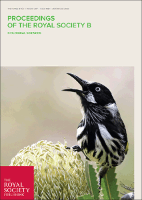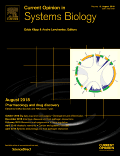
Systematic Biology
Scope & Guideline
Unraveling the complexities of biodiversity through rigorous research.
Introduction
Aims and Scopes
- Computational Modeling in Biology:
The journal emphasizes the use of computational models to simulate and understand biological phenomena, including metabolic pathways, signaling networks, and cellular processes. - Systems Biology Approaches:
It promotes a systems biology perspective that integrates data from various biological disciplines to understand the interactions within biological systems. - Multiscale and Network Analysis:
The journal explores multiscale modeling to represent biological processes at different levels of complexity, including molecular, cellular, and organismal scales. - Synthetic Biology Innovations:
It covers advancements in synthetic biology, particularly in engineering biological systems for practical applications such as therapeutics and biomanufacturing. - Ecological and Evolutionary Dynamics:
The journal examines biological systems through ecological and evolutionary lenses, exploring interactions among organisms and their environments.
Trending and Emerging
- Precision Medicine and Personalized Approaches:
There's an increasing emphasis on using systems biology to inform precision medicine, particularly in cancer treatment and individual patient responses. - Synthetic and Engineered Biological Systems:
Research on synthetic biology, including the engineering of microbial systems for bioproduction and therapeutic applications, is gaining traction, reflecting its relevance in addressing global challenges. - Data Integration and Computational Techniques:
The journal is seeing a rise in publications that focus on advanced computational techniques, including machine learning and data integration, to enhance biological modeling and analysis. - Ecological Interactions and Microbial Communities:
Emerging themes include the study of ecological interactions and microbial communities, underscoring the importance of understanding biological systems in their natural contexts. - Multi-Omics Approaches:
There is a growing trend towards the application of multi-omics approaches that integrate genomics, transcriptomics, proteomics, and metabolomics to provide a comprehensive view of biological systems.
Declining or Waning
- Traditional Experimental Biology:
There seems to be a waning interest in purely experimental approaches without computational or systems-level integration, as the field increasingly values data-driven insights. - Basic Descriptive Studies:
Papers focusing solely on descriptive studies of organisms without a systems biology framework are becoming less common, reflecting a move towards hypothesis-driven and model-based research. - Single-Organism Studies:
Research centered on single-organism studies, especially those lacking comparative or ecological context, is less frequently published, suggesting a trend towards more integrative studies.
Similar Journals

Communications Biology
Connecting Researchers through Cutting-Edge DiscoveriesCommunications Biology, published by NATURE PORTFOLIO, is a premier open-access journal that has been at the forefront of biological sciences since its inception in 2018. With a remarkable impact factor and a strong reputation in the field, it has achieved prestigious Q1 rankings in Agricultural and Biological Sciences, Biochemistry, Genetics and Molecular Biology, and Medicine, highlighting its significance in disseminating cutting-edge research. The journal is renowned for its focus on innovative, interdisciplinary biological studies, making it an essential platform for researchers, professionals, and students alike, eager to contribute to and engage with the latest discoveries. With its commitment to accessibility, all articles published are openly available to the global research community, furthering the collaboration and advancement of knowledge in the biological sciences. For more information, access options, and submission guidelines, please visit the journal's website.

npj Systems Biology and Applications
Integrating Science for a Healthier Tomorrownpj Systems Biology and Applications, published by NATURE PORTFOLIO, is a premier open-access journal that has been at the forefront of the field since its inception in 2015. With a commendable focus on the interdisciplinary integration of applied mathematics, biochemistry, computer science, and drug discovery, the journal currently enjoys a Q1 ranking across multiple categories, showcasing its significant impact within the scientific community. In 2023, it ranked 70 out of 635 in Applied Mathematics and holds a notable place in the 89th percentile, confirming its esteemed reputation among researchers. Situated in the United Kingdom, this journal not only promotes innovative research in systems biology but also serves as an essential platform for the dissemination of high-quality studies that delve into modeling, simulation, and the application of biological systems in drug discovery processes. With an open-access model, authors can reach a broad audience, enhancing collaborations and advancing knowledge across disciplines, making it an indispensable resource for researchers, professionals, and students alike seeking to contribute to the evolving landscape of systems biology.

Quantitative Biology
Advancing Biological Insights Through Quantitative MethodsQuantitative Biology is a prestigious journal published by WILEY, focusing on the interdisciplinary study of quantitative approaches in the biological sciences. With an ISSN of 2095-4689 and an E-ISSN of 2095-4697, this journal has established itself as a critical platform for researchers exploring complex biological systems through mathematical and computational methodologies. Operating out of China, Quantitative Biology significantly contributes to its field, holding a Q2 ranking in various categories, including Applied Mathematics and Biochemistry, Genetics and Molecular Biology, according to the latest Scopus rankings. These rankings reflect the journal's commitment to publishing high-quality research that employs advanced modeling and simulation techniques. The journal's impact is evident with its position in the 84th percentile for Applied Mathematics, indicating its relevance and growth in a competitive academic landscape. Although it does not currently operate under an Open Access model, the journal is pivotal for professionals and students alike, aiming to bridge the gap between mathematical theories and biological applications. Researchers are encouraged to submit their innovative findings and engage with the vibrant community dedicated to advancing the quantitative understanding of biological phenomena.

PROCEEDINGS OF THE ROYAL SOCIETY B-BIOLOGICAL SCIENCES
Bridging Disciplines for Scientific ExcellencePROCEEDINGS OF THE ROYAL SOCIETY B-BIOLOGICAL SCIENCES, published by the esteemed Royal Society, stands as a premier platform for disseminating cutting-edge research in the fields of Biological Sciences. With an impressive impact factor reflective of its high citation rates and scholarly contributions, this journal encompasses a wide array of disciplines, including Agricultural and Biological Sciences, Biochemistry, Genetics and Molecular Biology, Environmental Science, and Immunology and Microbiology, consistently ranking in the Q1 category across these fields. Since its inception in 1946, it has been committed to advancing our understanding of biological systems and informing evidence-based practices. Researchers and academics can submit their work without the Open Access barrier, thereby maintaining the integrity of the disciplinary discourse while providing comprehensive insights. The journal's location in the United Kingdom also positions it at the heart of global scientific innovation, making it a vital resource for professionals and students alike who are eager to explore the latest trends and breakthroughs in the biological sciences.

Current Opinion in Systems Biology
Advancing knowledge in the intricate world of systems biology.Current Opinion in Systems Biology is an esteemed academic journal published by ELSEVIER, focusing on the dynamic and interdisciplinary field of systems biology. Since its inception in 2017, the journal has made significant strides in disseminating cutting-edge research and innovative perspectives across various domains, including applied mathematics, biochemistry, and drug discovery. With an impressive impact factor reflecting its prominent position as a Q1 journal in multiple categories—including Applied Mathematics, Biochemistry, and Computer Science Applications—it serves as a vital resource for researchers, professionals, and students alike. The journal embraces a comprehensive approach to understanding complex biological systems, fostering a deeper insight into the interactions within biological and computational frameworks. This makes it an essential conduit for advancing knowledge and innovation in systems biology, facilitating the development of new methodologies that could lead to groundbreaking discoveries.

BULLETIN OF MATHEMATICAL BIOLOGY
Advancing the Intersection of Mathematics and BiologyBulletin of Mathematical Biology, published by Springer, is a premier journal dedicated to advancing the field of mathematical biology. With an ISSN of 0092-8240 and an E-ISSN of 1522-9602, this journal has been at the forefront of interdisciplinary research since its inception in 1973, continuing to deliver high-quality contributions through 2024. Operating without an open-access model, the journal maintains robust academic rigor, reflected in its category quartiles for 2023, which positions it in Q1 and Q2 across several relevant fields, including Agricultural and Biological Sciences, Biochemistry, Genetics, and Mathematics, among others. Its impressive Scopus ranks further underscore its significance, placing it in the top tier of journals in general mathematics and agricultural sciences. Researchers, professionals, and students looking to deepen their understanding and contribute to the evolving landscape of mathematical biology will find this journal an essential resource for contemporary studies and advancements in the field.

HOMO-JOURNAL OF COMPARATIVE HUMAN BIOLOGY
Illuminating the Complexity of Human BiologyHOMO - Journal of Comparative Human Biology is a prestigious academic journal dedicated to advancing the field of comparative human biology, offering a platform for researchers, professionals, and students to disseminate cutting-edge findings. Published by E Schweizerbart'sche Verlagsbuchhandlung in Germany, this journal has been a crucial resource since its inception in 1950, featuring a rich archive of studies until 2023. It holds a Q3 quartile ranking in Anthropology and a Q4 quartile ranking in Miscellaneous Medicine, reflecting its significance and influence within the academic community. Although not an Open Access journal, it provides a wealth of robust research that intersects with various disciplines within the anthropological sciences. Researchers looking for a wide array of comparative studies and insights into human biology will find HOMO an invaluable addition to their scholarly resources.

Biological Theory
Advancing Understanding in Ecology and EvolutionBiological Theory is an esteemed academic journal published by Springernature, focusing on the interdisciplinary realms of ecology, evolution, behavior, and philosophy of science. With an ISSN of 1555-5542 and an E-ISSN of 1555-5550, the journal had its converged years from 2006 to 2011 and from 2013 to 2024, reflecting its commitment to ongoing scholarly dialogue. Notably, it holds a prestigious Q2 ranking in Ecology, Evolution, Behavior and Systematics, and an impressive Q1 ranking in History and Philosophy of Science, highlighting its influential role in shaping discussions across these fields. The journal is well-received in the academic community, with Scopus rankings placing it in the 88th percentile for History and Philosophy of Science and the 59th percentile for Ecology, demonstrating its broad impact and relevance. Researchers, professionals, and students can access cutting-edge theories and critical analyses of biological concepts that contribute to a deeper understanding of life sciences without an open access model, further emphasizing the journal's significance in both historical and contemporary scientific discourse.

Biology Letters
Exploring the frontiers of biological inquiry with precision.Biology Letters, published by the esteemed Royal Society, stands at the forefront of research in the field of biological sciences, with a strong emphasis on innovative studies that bridge gaps across disciplines. Since its inception in 2005, the journal has garnered significant recognition, achieving a remarkable Q1 ranking in Agricultural and Biological Sciences (miscellaneous) and a percentile of 88th in the same category, according to Scopus rankings. Released in the United Kingdom, the journal offers a platform for authors to share concise research findings and theoretical perspectives that contribute meaningfully to the advancement of biological inquiry. Although not open access, the journal remains highly regarded in the academic community for its rigorous peer-review process and impactful content, making it an invaluable resource for researchers, professionals, and students dedicated to exploring the complexities of biology. With an ongoing commitment to excellence, Biology Letters continues to shape the future of biological sciences.

Evolutionary Biology
Pioneering Insights into Ecology and EvolutionEvolutionary Biology is a distinguished academic journal published by Springer, focusing on the intricate fields of ecology, evolution, behavior, and systematics. This journal, with the ISSN 0071-3260 and E-ISSN 1934-2845, has established itself as a critical platform for cutting-edge research and innovative ideas that shape our understanding of biological evolution and its implications. Operating from Germany, it ranks in the Q2 quartile in its category for 2023, placing it in the top tier of journals recognized for quality and impact, with a Scopus rank in the 66th percentile among its peers. Despite not being Open Access, this journal ensures comprehensive dissemination of knowledge essential for researchers, professionals, and students passionate about evolutionary studies. With a publication history tracing back to 1993 and converging years up to 2024, Evolutionary Biology continues to significantly impact the academic landscape, fostering dialogue and collaboration across various disciplines within the biological sciences.